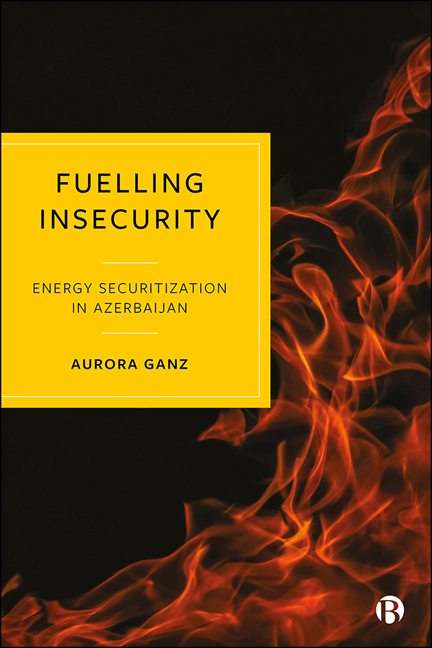Book contents
- Frontmatter
- Dedication
- Contents
- 1 Introduction
- 2 An Analysis of Actually Existing Energy Securitizations
- 3 Energy Securitization in the Land of Fire
- 4 Everyday Practices of Energy Security in Azerbaijan
- 5 Beyond the National Borders: NATO and Energy Security in Azerbaijan
- 6 Energy Securitization and the Private Sector: The Case of BP
- 7 Energy (In)Securitization: Abusive Security Practices and Poor Energy Choices
- 8 Conclusion
- References
- Index
8 - Conclusion
Published online by Cambridge University Press: 13 May 2022
- Frontmatter
- Dedication
- Contents
- 1 Introduction
- 2 An Analysis of Actually Existing Energy Securitizations
- 3 Energy Securitization in the Land of Fire
- 4 Everyday Practices of Energy Security in Azerbaijan
- 5 Beyond the National Borders: NATO and Energy Security in Azerbaijan
- 6 Energy Securitization and the Private Sector: The Case of BP
- 7 Energy (In)Securitization: Abusive Security Practices and Poor Energy Choices
- 8 Conclusion
- References
- Index
Summary
This book has explored the particular visions of order, the forms of authority and the patterns of social organization around which the problematization of energy as a security concern coheres. To do so, it has used discourse analysis to examine the discursive construction of energy as an existential security issue and conducted a critical mapping of the national, international and private actors involved in the labour of performing energy security in Azerbaijan. Unlike most studies of energy securitization, this book has not limited its inquiry to a state-based conceptualization of the analytical space. Conversely, it has been mindful of the constant intersections amidst local, national, global and private forms of authority. In fact, this research has focused on three case studies as representative of three distinct social selves involved in the securitization of energy in Azerbaijan: the state security actors, which stand for the national social universe; NATO for the international; and the British energy company BP for the private. This book has focused on four main issues. First, it has paid attention to the fixation on energy security practices that imply the actual or potential use of force, explaining how and why they have been normalized and taken for granted. In this regard, this book has exposed the similarities of discourses and practices amidst the different actors under scrutiny. Empirical evidence has shown that the construction and management of energy security threats in Azerbaijan portrays an idea of security that is fundamentally aggressive. This aggressivity presupposes protection and controllability, materializes through a combination of practices of coercion and control, and embeds the logic of security into the technical, economic and material domains of the oil and gas industry.
However, it has become evident that energy securitization is not simply about defining threats to specific energy objects but refers to a much more complex sociotechnical process. Thus, this research has also looked for the diversities that define the actually existing character of energy securitization. Securing energy emerges as a cultural and political practice, indicative of specific beliefs, judgements and imaginaries that determine the identification of energy security threats and solutions. Energy security practices can be taught, passed on and spread across territories. This analysis has explained that the diversity of perceptions and interests results in competition and mediation that allow knowledge about energy security to flow between actors and sectors; certain practices are spread, taught, imposed and absorbed.
- Type
- Chapter
- Information
- Fuelling InsecurityEnergy Securitization in Azerbaijan, pp. 163 - 170Publisher: Bristol University PressPrint publication year: 2021

